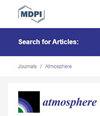Research on the Mechanism of the Influence of Thermal Stress on Tourists’ Environmental Responsibility Behavior Intention: An Example from a Desert Climate Region, China
IF 2.3
4区 地球科学
Q3 ENVIRONMENTAL SCIENCES
引用次数: 0
Abstract
The desert climate region attracts a multitude of tourists due to its distinctive landforms and climatic conditions, however, it also presents challenges for environmental protection. This article constructs a theoretical model that examines the influence of thermal stress on tourists’ environmental responsibility behavior intention (ERBI), with anticipated pride and anticipated guilt serving as mediating factors. An empirical study is conducted in Turpan, Xinjiang, which represents a typical inland arid area in China. The results indicate that: (1) thermal stress does not have a significant direct impact on ERBI, nevertheless, anticipated pride and anticipated guilt play crucial mediating roles between thermal stress and this intention. (2) Furthermore, environmental knowledge positively moderates the relationship between anticipated pride, anticipated guilt, and the ERBI. This research contributes to the understanding of how tourists’ anticipatory emotions affect their ERBI in desert climate regions while deepening our comprehension of the driving mechanisms behind such intentions among tourists. Moreover, it provides theoretical references for promoting environmentally responsible behaviors among tourists visiting desert climate regions.热应激对游客环境责任行为意向的影响机制研究:以中国沙漠气候地区为例
沙漠气候地区因其独特的地貌和气候条件吸引了众多游客,但同时也给环境保护带来了挑战。本文构建了一个理论模型,以预期自豪感和预期内疚感为中介因素,探讨热应力对游客环境责任行为意向(ERBI)的影响。实证研究在中国典型的内陆干旱地区新疆吐鲁番进行。研究结果表明(1) 热应激对 ERBI 没有显著的直接影响,但预期自豪感和预期内疚感在热应激和 ERBI 之间起着关键的中介作用。(2)此外,环境知识对预期自豪感、预期内疚感和 ERBI 之间的关系起着积极的调节作用。这项研究有助于理解游客的预期情绪如何影响他们在沙漠气候地区的ERBI,同时加深了我们对游客这种意向背后驱动机制的理解。此外,它还为促进游客在沙漠气候地区的环境责任行为提供了理论参考。
本文章由计算机程序翻译,如有差异,请以英文原文为准。
求助全文
约1分钟内获得全文
求助全文
来源期刊

Atmosphere
METEOROLOGY & ATMOSPHERIC SCIENCES-
CiteScore
4.60
自引率
13.80%
发文量
1769
审稿时长
1 months
期刊介绍:
Atmosphere (ISSN 2073-4433) is an international and cross-disciplinary scholarly journal of scientific studies related to the atmosphere. It publishes reviews, regular research papers, communications and short notes, and there is no restriction on the length of the papers. Our aim is to encourage scientists to publish their experimental and theoretical research in as much detail as possible. Full experimental and/or methodical details must be provided for research articles.
 求助内容:
求助内容: 应助结果提醒方式:
应助结果提醒方式:


